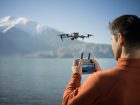
The time-tested parental observation advises that one learns more about a situation by heeding what people do rather than what they say. That may also be said of the recent decision by the Baltimore Police Department in establishing its new drone fleet using DJI drones – and in doing so broadly reflecting the frequent response of independent administrations to the largely politicized moves by Congress, US government agencies, and several state legislatures to blacklist the UAV giant’s craft from official use across the nation.
After several months of deliberation, Baltimore police officials were given the green light by the city last week to buy just over $38,152 in drones made by DJI – equipment that politicians across the country have been banning as purported threats of data leaking. The move comes less than a month after the municipality of Grand Rapids, Michigan, cleared the purchase of $100,000 DJI UAVs for law enforcement purposes, and other public agencies in the US similarly unbound by prohibitions have acquired the company’s gear.
Those decisions continue to be made despite multiplying federal and state blacklists of DJI drones over the past two years. Backers of those bans have thus far supplied virtually no evidence supporting claims the China-manufactured UAVs leak user data they collect back to government services in Beijing.
DJI, for its part, has repeatedly refuted those accusations. It has also rejected accompanying claims it has abetted state repression of human rights in China and is partially financed by state organizations as entirely unfounded.
Meanwhile, public administrations caught in the middle of the wider political tussle while looking to acquire new drones to serve the communities they represent are frequently – when they have the freedom to do so – buying DJI gear as the most effective and financially responsible option they find. Such was the case in Maryland.
Though the Baltimore Police Department’s draft policy outlining its proposed use of UAVs didn’t stipulate the make or models of craft under consideration, local TV station WBAL reported funds approved by the municipal spending board were invested this month in “three DJI drones, a GPS-mapping package and equipment.”
Perhaps not coincidentally, WBAL and other media coverage of what otherwise might have been considered relatively banal procurement procedures focused on – and quoted experts supporting – bans of the craft by several federal agencies, as well as Florida, Arkansas, Tennessee, and Alabama.
For good measure, WBAL also reported six other Maryland police departments besides Baltimore also operate DJI drones. One of its sources – a former Trump-appointed security official – described the UAVS as a tool of “a nation-state adversary that doesn’t like the United States.”
And in a particularly rich kicker, WBAL wrapped up its report with the disclosure its own “parent company uses drones made by DJI for news-gathering purposes” – a practice that it added is currently undergoing review.
Unreported in its coverage, however, was the considerable degree of politization and protectionism surrounding the blacklisting movement of the DJI’s drones by US and state politicians.
Many of legislators backing those initiatives, meanwhile, have also joined US drone industry lobbies to push for taxpayer funded subsidies to be granted to domestic producers. They claim that support would allow domestic UAV makers to be more competitive with the Shenzhen giant in their own, otherwise free market.
Baltimore city and police officials have responded to the politicized tone of coverage surrounding their choice of DJI UAVs by noting the decision went through a long-established, publicly accessible procurement and bidding process. The final choice was ultimately made, according to a statement the department issued, based on which craft offered the best tech and performance return for taxpayer money invested.
“The DJI-manufactured drones were determined to be the most effective and cost efficient for police use,” the BDP statement sent to WBAL said. “In reference to national security concerns, the drones that were selected do not transmit sensitive information to China or any other external entity, and can be operated entirely offline to prevent data-sharing with external sources.”
In a virtually ignored aspect of Baltimore establishing its drone unit, the department issued a list of functions for which the craft would and would not be used by – usually the most closely scrutinized element in new UAV deployment by police. Those include SWAT situations, search and rescue, suspect flight and barricade scenarios, and various unfolding serious crime circumstances.
In discussing the selection of DJI drones to perform those functions for Baltimore police, city Mayor Brandon Scott told WBAL the decision came down to brass tack factors of cost effectiveness, performance, and enhanced safety objectives.
“We know SWAT and things like that, (and) we want to have the drones versus putting people at risk and we’re going to continue to do that,” Scott said, indicating the force would have selected US-made drones proposed if that had been the better option. “We put it out for bid. We have a process here in the city of Baltimore that we have to follow by the charter, and we followed the process.”
Image: WBAL
FTC: We use income earning auto affiliate links. More.




Comments